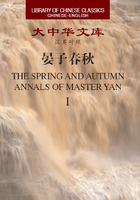
3.11 [61] 景公问古之盛君其行如何晏子对以问道者更正
齐景公问古时候的圣明君主的德行是什么样的,晏子回答说询问道义的人都改行正道
【原文】
景公问晏子曰:“古之盛君,其行如何?”晏子对曰:“薄于身而厚于民,约于身而广于世;其处上也,足以明政行教,不以威天下;其取财也,权有无,均贫富,不以养嗜欲;诛不避贵,赏不遗贱;不淫于乐,不遁于哀;尽智导民而不伐焉,劳力(岁事)〔事民〕而不责焉;(为)政尚相利,故下不以相害〔为〕行;教尚相爱,故民不以相恶为名。刑罚中于法,废罪顺于民。是以贤者处上而不华,不肖者处下而不怨,四海之内,社稷之中,粒食之民,一意同欲。若夫私家之政,生有〔厚利〕,〔死有〕遗教,此盛君之行也。”(公不图),晏子曰:“臣闻问道者更正,闻道者更容。今君税敛重,故民心离;市买悖,故(啇)〔商〕旅绝;玩好充,故家货殚。积邪在于上,蓄怨藏于民,嗜欲备于侧,毁非满于国,而公不图。”公曰:“善。”于是令玩好不御,公市不豫,宫室不饰,业土不成,止役轻税,上下行之,而百姓相亲。
【今译】
3.11 [61] DUKE JING INQUIRED REGARDING THE CONDUCT OF THE GREAT RULERS OF ANCIENT TIMES. YANZI REPLIED THAT THOSE WHO ASK ABOUT THE WAY CHANGE THEIR HEARTS.[1]
Duke Jing queried Yanzi as follows: “What characterized the conduct of the great rulers of ancient times?”
Yanzi replied: “They restricted themselves,but were generous to the people. As for themselves,they were restrained,but towards the world,they were generous. In their position as superiors,they were fit to practice enlightened rule and moral instructions. They did not use their position to intimidate the world. In collecting money and goods,they balanced the weight of the haves and the have-nots; they treated the poor and the rich w ith equity; and they did not use their positions to indulge their own desires. When they applied punishments,they did not shy away from the nobles,and when they gave rewards,they did not neglect the low ly. They were not extravagant in their pleasures,and they did not get mired in grief. They used their w isdom to the fullest in guiding the people,but they were not boastful in doing so. They worked extremely hard to serve the people and did not find fault w ith them. Their government promoted mutual benefit; therefore,their subjects did not consider mutual harm to be acceptable conduct. Their m oral teaching promoted mutual love; therefore,the people did not regard mutual hatred as a way to gain fame. Punishments followed the law precisely,and dismissals and indictments were made in accordance w ith the circumstances of the people. Therefore,the worthy occupied superior positions w ithout ostentation,and the unworthy occupied inferior positions w ithout resentment. Within the Four Seas and the domain of the altars of soil and grain,the people who lived on grain[2] shared a common purpose and identical desires. This was like the managing of a private family: during their lifetime,they had large benefits; when they died,they left their moral teaching. Such was the conduct of the mighty rulers. I have heard that those who ask about the Way change their hearts,[3] and those who hear about the Way change their countenance. But now,your tax collections,my Lord,are heavy; therefore,the hearts of the people turn away from you. Market conditions are adverse,and therefore tradesmen and traveling merchants abandon you. Fine things and precious objects abound,and therefore the wealth of households is exhausted. Those in superior positions amass w ickedness,and the people horde up resentments. You have all that you desire w ithin your palace,while slander and defamation spread throughout your capital,yet you still do not try to resolve all this.”
The Duke said: “Well argued.”
Thereupon,he prohibited the carrying of fine things and precious objects,inflated prices in the market,decoration of palaces,and completion of the earthworks for construction. He stopped compulsory labor and lowered taxes. Superiors and inferiors followed these decrees,and the people felt kinship w ith one another.
注释
[1]正→心 (JS,206/13).
[2]I.e.,the Chinese,as opposed to tribes surrounding China.
[3]正→心 (JS,206/13).